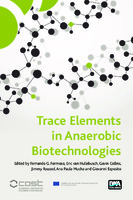Trace Elements in Anaerobic Biotechnologies
Author(s)
Fermoso, Fernando G.
van Hullebusch, Eric
Collins, Gavin
Roussel, Jimmy
Mucha, Ana Paula
Esposito, Giovanni
Language
EnglishAbstract
The use of trace elements to promote biogas production features prominently on the agenda for many biogas-producing companies. However, the application of the technique is often characterized by trial-and-error methodology due to the ambiguous and scarce basic knowledge on the impact of trace elements in anaerobic biotechnologies under different process conditions. This book describes and defines the broad landscape in the research area of trace elements in anaerobic biotechnologies, from the level of advanced chemistry and single microbial cells, through to engineering and bioreactor technology and to the fate of trace elements in the environment. The book results from the EU COST Action on ‘The ecological roles of trace metals in anaerobic biotechnologies’. Trace elements in anaerobic biotechnologies is a critical, exceptionally complex and technical challenge. The challenging chemistry underpinning the availability of trace elements for biological uptake is very poorly understood, despite the importance of trace elements for successful anaerobic operations across the bioeconomy. This book discusses and places a common understanding of this challenge, with a strong focus on technological tools and solutions. The group of contributors brings together chemists with engineers, biologists, environmental scientists and mathematical modellers, as well as industry representatives, to show an up-to-date vision of the fate of trace elements on anaerobic biotechnologies.
Keywords
Wastewater; Reuse & SludgeDOI
10.2166/9781789060225ISBN
9781789060225OCN
1117284908Publisher
IWA PublishingPublisher website
https://www.iwapublishing.com/Publication date and place
2019Classification
Water supply and treatment


 Download
Download Web Shop
Web Shop